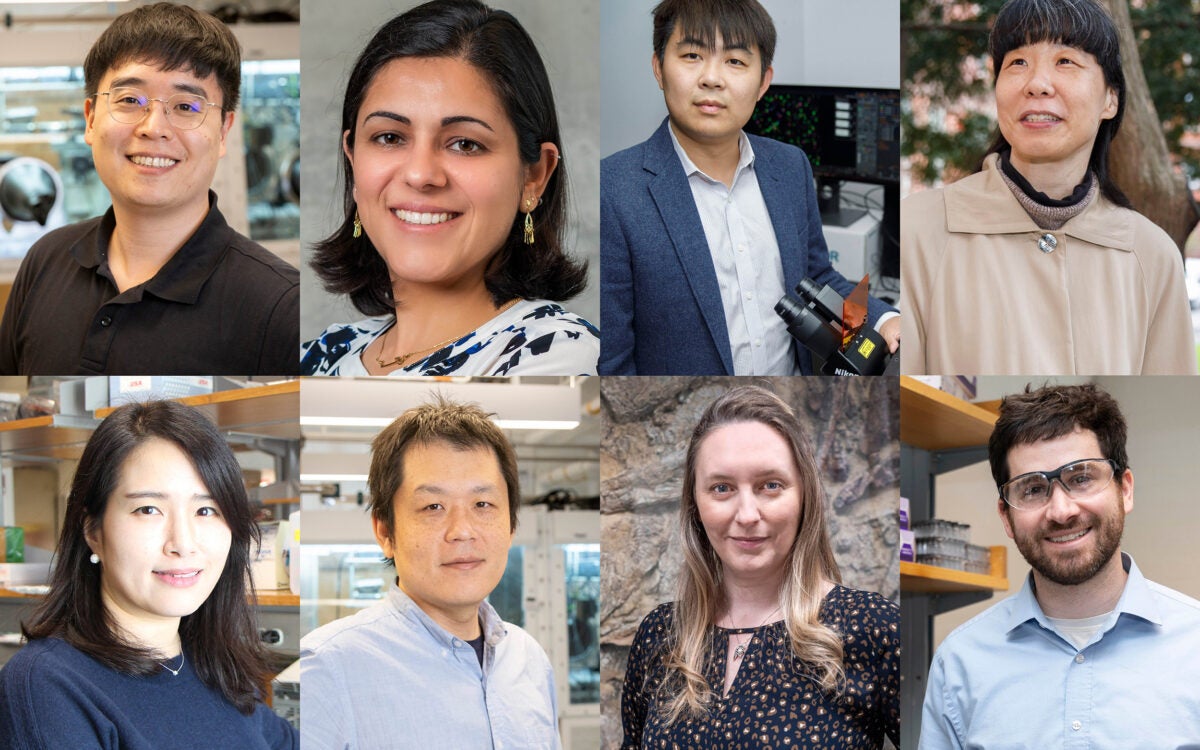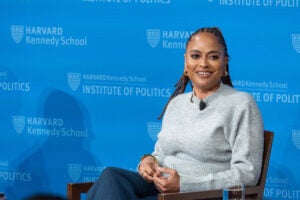Tag: Cellular Biology
-
Nation & World
Scientists unlock secret of death protein’s activation
Harvard Medical School researchers at Dana-Farber Cancer Institute have identified a previously undetected trigger point on a naturally occurring “death protein” that helps the body get rid of unwanted or…
-
Nation & World
Another step forward in cell reprogramming
Imagine, if you can, a day within the next decade when a physician-scientist could remove a skin cell from your arm, and with a few chemicals turn that fully formed adult cell into a dish of stem cells genetically matched to you.
-
Nation & World
Dowling recipient of Paul Kayser Award
John E. Dowling, Gordon and Llura Gund Professor of Neurosciences of the Department of Molecular and Cellular Biology as well as professor of Ophthalmology in Neuroscience, recently received the Paul Kayser International Award in Retina Research from the International Society for Eye Research (ISER). He received the award at the 2008 Biennial Congress held in…
-
Nation & World
NIH selects nine Pioneers, Innovators from Harvard
Nine Harvard faculty members are among 47 scientists nationally whose promising and innovative work was recognized Monday (Sept. 22) with the announcement of two grant programs through the National Institutes of Health (NIH).
-
Nation & World
Important new step toward producing stem cells for human treatment
A team of Harvard Stem Cell Institute (HSCI) scientists has taken an important step toward producing induced pluripotent stem (iPS) cells that are safe to transplant into patients to treat…
-
Nation & World
Susan E. Mango named professor of molecular and cellular biology
Susan E. Mango, whose study of pharynx development in nematode worms has provided biologists with one of their most robust models of organ development, has been named professor of molecular and cellular biology in the Faculty of Arts and Sciences (FAS), effective July 1, 2009. Mango, 46, was previously professor of oncological sciences at the…
-
Nation & World
Harvard Stem Cell Institute researchers turn one form of adult mouse cell directly into another
In a feat of biological prestidigitation likely to turn the field of regenerative medicine on its head, Harvard Stem Cell Institute (HSCI) co-director Doug Melton and post doctoral fellow Qiao…
-
Nation & World
Driven:
When the baby vomited again, Gail Melton knew something was seriously wrong with her second child, a son she and her husband, Doug Melton, had named Sam. She phoned Doug…
-
Nation & World
Broad Institute earns grant to support pathbreaking diabetes study
Researchers at the Broad Institute of Harvard and MIT have received a grant to support novel, integrative research aimed at finding ways to encourage the human body to replenish the cells that are missing in type 1 diabetes.
-
Nation & World
Across species, genes evolve to minimize protein production errors
Scientists at Harvard University and the University of Texas, Austin, have found that genetic evolution is strongly shaped by genes’ efforts to prevent or tolerate errors in protein production.
-
Nation & World
Aquatic genome captures foreign DNA
Long viewed as straitlaced spinsters, sexless freshwater invertebrate animals known as bdelloid rotifers may actually be far more promiscuous than anyone had imagined: Scientists at Harvard University have found that the genomes of these common creatures are chock-full of DNA from plants, fungi, bacteria, and animals.
-
Nation & World
Protective mechanism fails when obesity sets in
Reporting in the journal Cell Metabolism, researchers from the Harvard School of Public Health (HSPH) said they have shown for the first time that fat-storing cells, or adipocytes, contain a protective anti-inflammatory immune mechanism that prevents the cells from overreacting to inflammation-causing stimuli, such as fatty acids in the diet.
-
Nation & World
Scientists learn what’s ‘up’ with retinal cells
Harvard University researchers have discovered a new type of retinal cell that plays an exclusive and unusual role in mice: detecting upward motion. The cells reflect their function in the physical arrangement of their dendrites, branchlike structures on neuronal cells that form a communicative network with other dendrites and neurons in the brain.
-
Nation & World
Harvard faculty members discuss state of research
A panel of experts said Tuesday (March 11) that stem cell research’s biggest impact on patients’ health likely won’t come from therapies that inject stem cells or implant tissues made from them, but rather from the knowledge gained by examining diseased tissues grown from the cells.
-
Nation & World
HMS, Broad Institute team works to better understand mitochondria
Why do nearly 1 million people taking cholesterol-lowering statins often experience muscle cramps? Why is it that in the rare case when a diabetic takes medication for intestinal worms, his glucose levels improve? Is there any scientific basis for the purported health effects of green tea?
-
Nation & World
Research in brief
GROWING U.S. DISPARITIES IN HEALTH NOT INEVITABLE NEW WAY TO GROW BLOOD VESSELS
-
Nation & World
From adult to embryonic stem cell
Harvard Stem Cell Institute (HSCI) and Massachusetts General Hospital (MGH) researchers have taken a major step toward eventually being able to reprogram adult cells to an embryonic stem cell-like state without the use of viruses or cancer-causing genes.
-
Nation & World
How brain cells make good connections
Harvard neuroscientist Venkatesh N. Murthy has a sunny second-floor office on Divinity Avenue, where he is a professor in Harvard’s Department of Molecular and Cellular Biology. In one corner is a set of weights and a soccer ball — both untouched in over a year, he said, because of an intensely busy schedule.
-
Nation & World
Drug based on MGH discovery may significantly improve treatment of dangerous blood disorder
Two clinical trials of the novel drug romiplostim (Nplate) show that it significantly improved platelet levels in patients with chronic immune thrombocytopenic purpura (ITP), a hematologic disorder that can cause uncontrolled…
-
Nation & World
Newly discovered type of cell death may end up inhibiting tumor growth
Sometimes healthy cells commit suicide. In the 1970s, scientists showed that a type of programmed cell death called apoptosis plays a key role in development, and the 2002 Nobel Prize in physiology or medicine recognized their work. As apoptotic cells degrade, they display standard characteristics, including irregular bulges in the membrane and nuclear fragmentation.
-
Nation & World
Decoding effort reveals fly species’ DNA
An enormous effort to decode the DNA of one of science’s most important laboratory animals — the fruit fly — ended in success this week as a collaboration of researchers from 16 nations announced the sequencing of 10 fly species’ genomes.
-
Nation & World
Scientists image vivid ‘brainbows’
By activating multiple fluorescent proteins in neurons, neuroscientists at Harvard University are imaging the brain and nervous system as never before, rendering these cells in a riotous spray of colors dubbed a “Brainbow.”
-
Nation & World
Researchers better understand biological clock
Researchers at Harvard University and the Howard Hughes Medical Institute (HHMI) have discovered that a simple circadian clock found in some bacteria operates by the rhythmic addition and subtraction of phosphate groups at two key locations on a single protein. This phosphate pattern is influenced by two other proteins, driving phosphorylation to oscillate according to…
-
Nation & World
Harvard researchers find longevity, restricted diet link
Researchers believe they’ve found the cellular link between extremely restricted diets and dramatically lengthened lifespan and hope to use the knowledge to develop new treatments for age-related diseases.
-
Nation & World
Former Congressman Leach named director of Institute of Politics
David T. Ellwood, dean of the Kennedy School of Government, recently announced that former U.S. Congressman James A. Leach (R-IA) has been named the new director of Harvard’s Institute of Politics (IOP). Leach will serve for this academic year, beginning immediately and succeeding outgoing director Jeanne Shaheen.
-
Nation & World
Major progress toward cell reprogramming
Two Harvard Stem Cell Institute (HSCI) researchers and scientists at Whitehead Institute and Japan’s Kyoto University have independently taken major steps toward discovering ways to reprogram cells in order to…
-
Nation & World
Research finds mutation that causes Noonan syndrome
Scientists have discovered that mutations in a gene known as SOS1 account for many cases of Noonan syndrome (NS), a common childhood genetic disorder that occurs in one in 1,000…
-
Nation & World
Key antibody IgG links cells’ capture and disposal of germs
Scientists have found a new task managed by the antibody that’s the workhorse of the human immune system: Inside cells, immunoglobulin G (IgG) helps bring together the phagosomes that corral…
-
Nation & World
Cells that work themselves to death
When you’re fighting flu or any other infection, your body mobilizes battalions of cells to defend against the invading viruses or bacteria. But once the invaders have been defeated and…
-
Nation & World
Important signal uncovered in brain development
Nobody has counted them, but the best estimates put the number of human brain cells in the trillions. The best known among them, called neurons, do the heavy thinking and…


